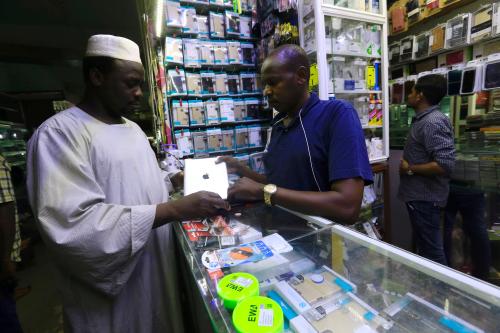Below is a viewpoint from Chapter 5 of the Foresight Africa 2018 report, which explores six overarching themes that provide opportunities for Africa to overcome its obstacles and spur inclusive growth. Read the full chapter on African technology, innovation, and digital potential here.
Technology entrepreneurs in Africa enter 2018 in a precarious position. Fortunately, we’ve seen gradual improvement in key areas. For instance, venture capital activity has grown and there are more transactions: Since 2012, venture capital has grown by a factor of 8.7 ($366,000,086 in 2016)[1] and we’ve seen a 40 percent year-over-year growth in deals closed.[2]
There are also notable improvements in the ease of doing business. According to the World Bank’s Doing Business 2018 Report, the following African countries were among the top 10 improved nations across the globe: Nigeria, Malawi, Zambia, and Djibouti. Nigeria moved up 24 spots (from 169 to 145).
In the face of uncertainty and adversity, the African entrepreneur not only finds a way to make it work, but also creates solutions that shape the future of the entire continent.
Because of the global slowdown in 2016, many African markets looked inward and set a foundation for inclusive and more sustainable growth. Specifically, they focused on macroeconomic reform, supported diversification, and emphasized domestic goods. Certain key indicators of growth have demonstrated healthy progress. Namely, there have been more venture capital deals, increased connectivity between markets and entrepreneurial ecosystems, and their macro conditions are heading in the right direction. There are major challenges, however, that require collective problem-solving to unlock the real power of technology entrepreneurship in Africa.
Increase access to capital for early-stage businesses. Foreign direct investment (FDI), venture capital, and financial products from banks are often distributed to established and later-stage companies. The lack of early-stage “market validation” capital must be addressed so that there are sufficient resources to get companies off the ground. Emerging technologies like artificial intelligence, virtual reality, and blockchain will require significant resources to get started and will lean on early-stage capital to build out teams of specialists, acquire required data, and scale technical infrastructure.
Radical solutions to energy deficiency. There’s great work under way by African public and private sector stakeholders to bring energy projects to fruition and improve energy regulations and policy. However, Africa’s energy needs are urgent and traditional ways of increasing electricity capacity are inherently slow. We need massive investments in decentralized, renewable, and flexible energy solutions to increase access to energy beyond urban areas and serve as a catalyst for growth in an equitable and sustainable way.
Train youth to be globally competitive. Improving access to quality education and professional outcomes is essential for long-term transformation. However, vocational and skills-based training can rapidly mobilize the job force necessary for key industries in a short period of time. Investing in education and practical and transferable skills training is an opportunity to fortify Africa’s greatest asset—its people.
Embrace globalization while protecting indigenous industries. Aging in advanced economies and some parts of emerging Asia is weighing on global economic growth. That reality provides African countries with possibilities for growth and global partnerships. African governments will have to balance courting multinationals to do business in their countries while also supporting nascent indigenous technologies and industries.
Investing in education and practical and transferable skills training is an opportunity to fortify Africa’s greatest asset—its people.
At tiphub, I have had the chance to work with companies faced with some of the above-mentioned challenges and see opportunities for value creation. Companies like Gebeya prepare young adults in East Africa with 21st century skills like programming, datab science, and user interface design—all skills needed to create solutions with emerging technologies. Another company, Scholarx, leverages the African diaspora and innovative financial instruments to make education more affordable for Nigerian students. Aledin Nano and Jamii Africa are two innovative companies taking traditional financial products and leveraging technology to distribute micro-lending and micro-insurance services to the masses. I’ve met founders who look at the energy deficiency as a massive opportunity to bring renewable and decentralized solutions to market.
Therein lies the key differentiator of the African entrepreneur. In the face of uncertainty and adversity, the African entrepreneur not only finds a way to make it work, but also creates solutions that shape the future of the entire continent. African entrepreneurs have the ingenuity to solve problems and they will continue to do so. Nevertheless, collaboration and coordination among companies and stakeholders like government agencies, multinationals, and non-governmental organizations can accelerate the path forward toward rapid and inclusive growth for all.
footnotes
1. Partech Ventures (2017), VC funding raised by African tech startups totals a record-breaking $366.8 million in 2016. https://goo.gl/cjP5Bm At the time of publication, the total amount of venture capital investment in 2017 had not yet been reported.
2. Partech Ventures (2017), VC funding raised by African tech startups totals a record-breaking $366.8 million in 2016. https://goo.gl/cjP5Bm At the time of publication, the total volume of transactions for 2017 had not been published.






Commentary
Foresight Africa viewpoint – African entrepreneurship in technology: Challenges and opportunities in 2018
January 31, 2018